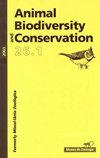使用综合分类学对印度西高止山脉生物多样性热点喀拉拉邦蚯蚓多样性的贡献
IF 1
4区 环境科学与生态学
Q3 BIODIVERSITY CONSERVATION
引用次数: 3
摘要
采用标准分类学方法研究了印度西高止山脉热点地区Chaliyar河Malappuram、Eravikulam国家公园、Neyyar野生动物保护区、Parambikulam老虎保护区、Peppara野生动植物保护区、Periyar国家公园、Shendrney野生动物保护区和喀拉拉邦Wayanad森林的蚯蚓(Clitellata、Moniligastridae),并首次使用线粒体基因细胞色素c氧化酶I(COI)产生了它们的DNA条形码签名。本研究代表了Moniligastridae科的11种蚯蚓:Drawida brunea Stephenson、Drawida环乳头虫Aiyer、Drawida ghatensis Michalsen、Drawidaa impetusa Stephenson、draida nilamburensis(Bourne)、Drawidas robusta(Bourne)、DrawIDAs scandens Rao、Drawidat travancorense Michalsen,Moniligaster aiyeri Gates、Moniligasters deshayesi Perrier,和Moniligaster gravelyi(斯蒂芬森饰)。在系统发育分析中,所有物种都在具有高分支支持的相邻连接树(NJ)和最大似然树(ML)中恢复。物种内部和物种之间的平均K2P距离为1.2%和22%,而所研究物种的条形码间隙分析(BGA)表明,清晰的条形码间隙为2-5%,反映了表征的准确性。这项研究为印度本土蚯蚓科Moniligastridae的分子表征迈出了第一步。通过GBIF发布的数据(Doi:10.15470/l2nhz)本文章由计算机程序翻译,如有差异,请以英文原文为准。
A contribution to the earthworm diversity (Clitellata, Moniligastridae) of Kerala, a component of the Western Ghats biodiversity hotspot, India, using integrated taxonomy
Earthworms (Clitellata, Moniligastridae) of Chaliyar River Malappuram, Eravikulam National Park, Neyyar Wildlife Sanctuary, Parambikulam Tiger Reserve, Peppara Wildlife Sanctuary, Periyar National Park, Shendurney Wildlife Sanctuary and Wayanad Forest, Kerala, a component of the hotspot of Western Ghats, India, were studied by the standard method of taxonomy, and their DNA barcode signatures using the mitochondrial gene cytochrome c oxidase I (COI) were generated for the first time. This study
represents eleven species of earthworms of the family Moniligastridae: Drawida brunnea Stephenson, Drawida circumpapillata Aiyer, Drawida ghatensis Michaelsen, Drawida impertusa Stephenson, Drawida nilamburensis (Bourne), Drawida robusta (Bourne), Drawida scandens Rao, Drawida travancorense Michaelsen, Moniligaster aiyeri Gates, Moniligaster deshayesi Perrier, and Moniligaster gravelyi (Stephenson). In the phylogenetic analysis all the species were recovered in both neighbour–joining (NJ) and maximum likelihood (ML) trees with high clade support. The average K2P distance within and between species was 1.2 % and 22 %, whereas the clear barcode gap of 2–5 % was suggested by barcode gap analysis (BGA) of studied species, reflecting the accuracy of characterization. The study presents the first step in the molecular characterization of the native earthworm family Moniligastridae of India.
Data published through GBIF (Doi: 10.15470/l2nlhz)
求助全文
通过发布文献求助,成功后即可免费获取论文全文。
去求助
来源期刊

Animal Biodiversity and Conservation
农林科学-动物学
CiteScore
2.00
自引率
0.00%
发文量
21
审稿时长
>12 weeks
期刊介绍:
Animal Biodiversity and Conservation (antes Miscel·lània Zoològica) es una revista interdisciplinar, publicada desde 1958 por el Museu de Ciències Naturals de Barcelona. Incluye artículos de investigación empírica y teórica en todas las áreas de la zoología (sistemática, taxonomía, morfología, biogeografía, ecología, etología, fisiología y genética) procedentes de todas las regiones del mundo. La revista presta especial interés a los estudios que planteen un problema nuevo o introduzcan un tema nuevo, con hipòtesis y prediccions claras, y a los trabajos que de una manera u otra tengan relevancia en la biología de la conservación. No se publicaran artículos puramente descriptivos, o artículos faunísticos o corológicos en los que se describa la distribución en el espacio o en el tiempo de los organismes zoológicos.
 求助内容:
求助内容: 应助结果提醒方式:
应助结果提醒方式:


